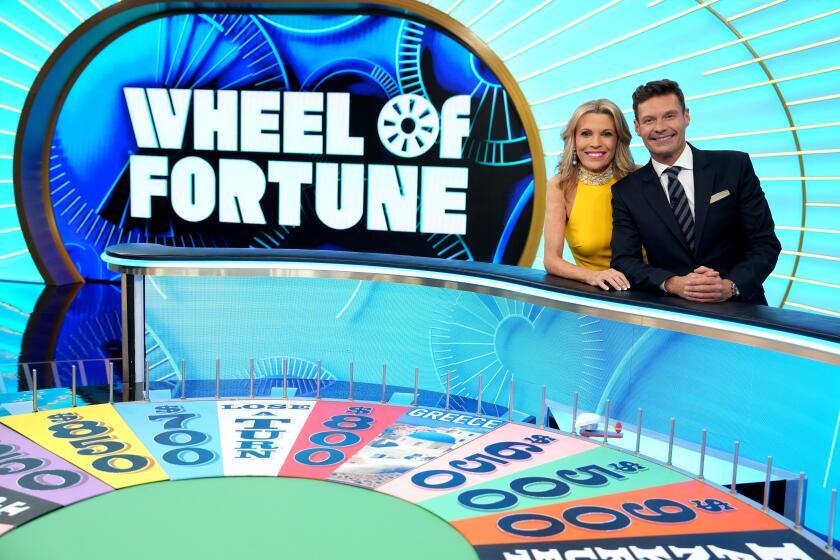Fox News’ Patriotic Fervor Sets It Apart in Ratings Race
NEW YORK — For once, the commentators, news anchors and reporters of Fox News Channel had fallen silent. In a tense New York control room and on hushed studio sets, they watched live, unedited TV footage with astonishment as a statue of Saddam Hussein was toppled and stomped by a cheering crowd in Baghdad.
Then the unapologetically patriotic, wisecracking heart of the top-rated cable news channel in the United States stirred to life: “I wonder what the French ambassador to the U.N. is thinking now?” chief Washington correspondent Brit Hume mused on the air.
Anchorman David Asman, waiting for reporters to confront the Iraqi ambassador to the U.S., Mohammed Douri, in a sidewalk interview, reminded viewers that “this is the guy who has the comb-over problem with his hair.” When an image of Democratic presidential candidate and Massachusetts Sen. John F. Kerry flickered on a control room screen, a technician muttered: “What that guy needs is a little more shock and awe.”
As TV networks compete for ratings supremacy during the war in Iraq, Fox News has solidified its lead over all-news competitors CNN and MSNBC, racking up the largest audiences in its six-year history. And on a day when history was made in Baghdad, a rare, behind-the-scenes glimpse showed why the channel that some media critics have dismissed as a right-wing mouthpiece has become such a success.
Patriotic Fervor
On one level, Fox News executives reacted the same way those at other networks did Wednesday morning as Baghdad fell. They scrambled to get reporters in place, rushed experts onto the set and assembled TV feeds from around the world to fill up a 24-hour news day.
Yet Fox’s formula -- which sets it apart -- also was on full display.
Anchors made no bones about their patriotic fervor and some ridiculed war critics; field reporters gushed that “liberty” was sweeping through Baghdad; flashy graphics underscored the images and a steady drumbeat of martial music linked the news segments. The overall presentation was provocative and livelier than a more button-down television news broadcast. It was, above all, entertaining.
The entertainment is often political. In a recent dispatch, retired Marine Lt. Col. Oliver North, now a Fox News correspondent, said he was moved by the sight of Iraqi children handing flowers to Marines, and then noted: “Notwithstanding all the prognosticators of gloom and doom back there at the New York Times and some of those other places, we’re not seeing that over here.”
The on-air commentary also can be unexpectedly bold. After noting President Bush’s statement that Hussein’s fingers were loosening around the throat of Iraq, bit by bit, anchor Shepard Smith suddenly asked: “Is that propaganda or truth? We’ll analyze that, coming up.”
All of these factors may help explain why Fox News has built its ratings lead. During the first 19 days of the war, for example, the network averaged 3.3 million viewers; CNN attracted 2.7 million viewers and MSNBC drew an average of 1.4 million, according to Nielsen Media Research ratings.
Some observers say that Fox News Channel, which is owned by Rupert Murdoch’s News Corp., owes much of its success to a conservative audience that prefers the channel’s coverage and commentary. Bill Kovach, chairman of the Committee of Concerned Journalists, said Fox News “has the most visibly ideological and politicized coverage that you’ll find on cable TV news.”
Fox News founder and Chief Executive Roger Ailes acknowledges that there are differences between his channel and competitors. Yet he dismisses the charge that his claims of “fair and balanced” journalism are simply code words for conservative bias.
“This is not about conservative or liberal, it’s about the presumption of innocence,” he said in an interview.
“In this country, we say that a person is presumed innocent until he is proven guilty, and I think our nation deserves the same courtesy. That’s what Fox News is all about; it’s what we try to do every day.”
Sometimes, however, the news catches everyone by surprise.
When the biggest story of the war began emerging Wednesday morning, the Fox News brain trust was meeting to discuss that day’s news by phone with reporters in California, Colorado, Atlanta, Washington and other locales.
John Moody, senior vice president for news at Fox who was running the 8:30 meeting, had distributed a memo suggesting that the war was entering a new phase. He also noted that the fascination with Hussein’s whereabouts was “as full of facts as a session with Miss Cleo. Let’s not get bogged down in whereizzy.”
A glimmer of the big news flashed just as the meeting began, when MSNBC ran a banner reading, “Baghdad Falls.” Moody, who had been a Time magazine correspondent and bureau chief for 14 years, was skeptical. “Be careful,” he alerted Marty Ryan, the producer running the control room. “That could be very premature.”
Seconds later, editors in the room couldn’t help but notice the live images of U.S. tanks and soldiers in Baghdad on three TV screens showing Fox, CNN and MSNBC simultaneously. “Is that cut-in worthy?” wondered one editor. “Yes, but everybody is going with the same picture now,” answered another. “So what’s the story here?”
The meeting resumed, and it wasn’t until 30 minutes later that the effect of what was happening became apparent. Asman, the morning anchor, strolled into the glass-enclosed room with a big grin. “This is it,” he said quietly. “This is the moment.”
Moody watched the TV feed and agreed, telling his staff, “we’re going to be looking at history today. So go with the moment -- and don’t be afraid to lose the banner.”
He was referring to the distinctive Fox News Channel logo that almost always runs in the lower-left corner of the television screen.
The banner “is our whole identity,” Moody said, “but on a day like this you have to let the picture tell the whole story.”
Watching Its Rivals
Fox executives watch their cable competition “obsessively,” he added, pointing to banks of television screens in the newsroom displaying Fox News, CNN and MSNBC simultaneously. “But not to the point where we let them decide what we do.”
By 9:15 the live television story from Baghdad was coming into focus: Reporters had freedom to roam the streets, the military appeared to be traveling at will throughout the city and a crowd was gathering at the 40-foot Hussein statue.
Now the main action at Fox News shifted to the control room. The nerve center, which takes up a small corner of Fox’s sprawling offices in a midtown high-rise, normally has only a small number of producers and other technicians monitoring the broadcast. By 9:30 a large crowd had assembled -- and all eyes were on Baghdad.
The two-tiered room, which includes large banks of television monitors and control panels, became tense and quiet. Ryan stood over the scene like a commander, hands on his hips, fielding calls and other communications from Fox News executives. He barked directions to technicians who were preparing live feeds from correspondents or getting ready to use video from other sources.
Normally, he would be plotting the sequence of feeds, two or three moves ahead. But now Ryan just watched as Iraqis battered the statue with hammers, and then as a U.S. military vehicle dragged it down. At one point, a technician mentioned that the Mexican ambassador to the U.N. might be saying something soon about North Korea, and the producer shot back: “I don’t think we care about that now.”
Up in Studio B, Asman and co-anchor Brigitte Quinn also watched the scene unfold. The day before, they and other Fox News anchors had spent much of their time discussing the possibility that Hussein and his sons had been killed in a U.S. bombing raid. It was largely speculation, and the talk filled hours of air time.
Now there was live news on the air. Hume noted at one point that “these pictures are the purest gold that the administration could imagine for this day.”
When a field correspondent pointed out that Iraqis trying to bring down the statue had draped a rope around only the ankle, Asman cracked: “The neck is a better place for it.”
He and Quinn marveled at the images, but breaking news interrupted again. A Fox News crew, anticipating reaction from Iraqi Americans in Dearborn, Mich., had driven a news truck up from Chicago and showed live scenes of a noisy, impromptu parade.
“Let’s go with both,” Ryan said in the control room, and the screen suddenly showed images of Iraqis simultaneously celebrating in Baghdad and the United States.
By midday, the novelty of live action from Baghdad had ended and all three cable news channels began repeating footage of the statue being toppled. The normal diet of talk and commentary slowly resumed, periodically interrupted by government briefings.
Playing to a Bias?
Hours later, the overnight ratings were faxed to executives throughout the building, and they showed Fox News maintaining its lead. As Quinn left her office and prepared to go home, she suggested that the channel’s personality was the key to its success.
“I don’t think we set out to be entertaining, but it happens, and our on-air people are honest,” she said.
“Today we didn’t become stuffy anchors. There’s no way you can watch these moments and not be moved. We’re like the viewers at home.”
So is the Fox News Channel simply playing to the bias of a loyal audience?
“If you look at everyone on our staff, personal opinions are pretty evenly divided here,” Asman said. “And, yes, sometimes we do wear our opinions on our lapels. But if you ask me: Can you be a patriot and an objective journalist? I think you can.”
Then he launched into a critique of other news organizations that had questioned the wisdom of the U.S. military’s battle plan against Iraqi forces.
“Fox News and the New York Post [also owned by News Corp.] have covered this war accurately,” he said. “But if you read nothing but the New York Times, the Washington Post and CNN, you’d get the impression that we were in trouble and weren’t winning.”
The bottom line, he said, is simple: “We get it right. They get it wrong.”
More to Read
The biggest entertainment stories
Get our big stories about Hollywood, film, television, music, arts, culture and more right in your inbox as soon as they publish.
You may occasionally receive promotional content from the Los Angeles Times.










